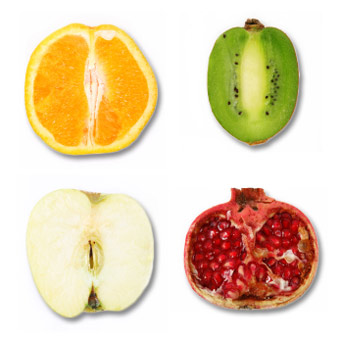Alkaline Foods
What are Alkaline Foods?
An alkaline diet emphasizes alkaline foods such as whole fruits and vegetables and certain whole grains, which are low in caloric density. Healthy Alkaline Diet Foods involve the ideal balance between acidifying and alkalizing foods.
 The body includes a number of organ systems that are adept at neutralizing and eliminating excess acid, but there is a limit to how much acid even a healthy body can cope with effectively. The body is capable of maintaining an acid-alkaline balance provided that the organs are functioning properly, that a well-balanced alkaline diet is being consumed, and that other acid-producing factors, such as tobacco use, are avoided.
The body includes a number of organ systems that are adept at neutralizing and eliminating excess acid, but there is a limit to how much acid even a healthy body can cope with effectively. The body is capable of maintaining an acid-alkaline balance provided that the organs are functioning properly, that a well-balanced alkaline diet is being consumed, and that other acid-producing factors, such as tobacco use, are avoided.
How many Americans today follow a healthy diet and regularly engage in other health-promoting activites?
The standard American diet is highly acid-forming, overwhelming the body's mechanisms for removing excess acid. The staples of the American diet are meat, dairy, corn, wheat, and refined sugars (all acidifying foods). At the same time, the diet is notably deficient in alkalizing fruits and vegetables. The alkaline diet greatly reduces this acid load, helping to reduce the strain on the body's acid-detoxification systems, such as the kidneys.
Here is a list of Alkaline Foods, especially High Alkaline Foods:
- Alkalining Vegetables: Beets, Broccoli, Cauliflower, Celery, Cucumber, Kale, Lettuce, Onions, Peas, Peppers, Spinach
- Alkalizing Fruits: Apple, Banana, Berries, Cantaloupe, Grapes, Melon, Lemon, Orange, Peach, Pear, Watermelon
- Alkalizing Protein: Almonds, Chestnuts, Tofu
- Alkalizing Spices: Cinnamon, Curry, Ginger, Mustard, Sea Salt
Note: a food's acid or alkaline forming tendency in the body has nothing to do with the actual pH of the food itself. Although it might seem that citrus fruits would have an acidifying effect on the body, the citric acid they contain actually has an alkalinizing effect in the system.
